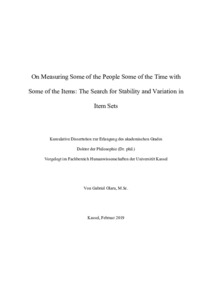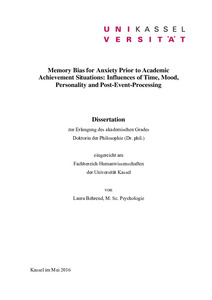Suche
Anzeige der Dokumente 1-2 von 2
Dissertation
 On Measuring Some of the People Some of the Time with Some of the Items: The Search for Stability and Variation in Item Sets
On Measuring Some of the People Some of the Time with Some of the Items: The Search for Stability and Variation in Item Sets
(2019-02)
Psychological assessment is shaped by the items used and the persons assessed. Both items and persons typically represent a random or representative sample of a much larger item and person pool. However, most of the focus on psychological measurement rests on the person sampling side. Item sampling from larger item pools is still a black box. In this dissertation, I present the advantages of new state-of-the-art item and person sampling procedures in the context of personality development research (manuscript 1). ...
Dissertation
 Memory Bias for Anxiety Prior to Academic Achievement Situations: Influences of Time, Mood, Personality and Post-Event-Processing
Memory Bias for Anxiety Prior to Academic Achievement Situations: Influences of Time, Mood, Personality and Post-Event-Processing
(2016-10-18)
The current thesis examines memory bias for state anxiety prior to academic achievement situations like writing an exam and giving a speech. The thesis relies on the reconstruction principle, which assumes that memories for past emotions are reconstructed rather than stored permanently and accurately. This makes them prone to memory bias, which is af-fected by several influencing factors. A major aim is to include four important influencing factors simultaneously. Early research on mood and emotional autobiographical ...


